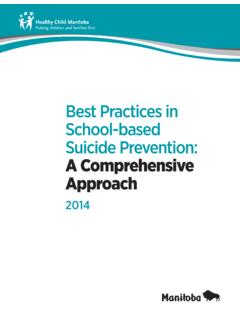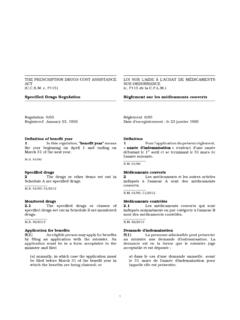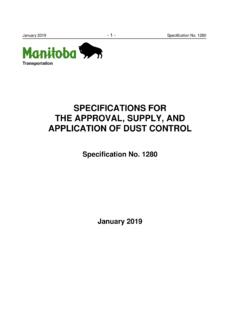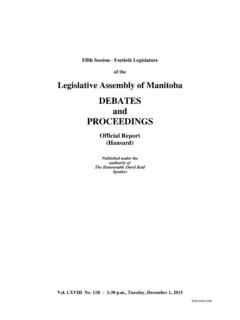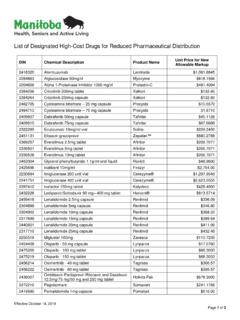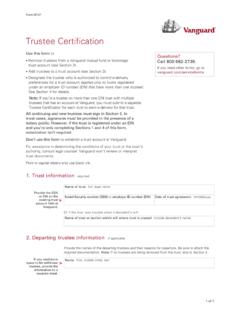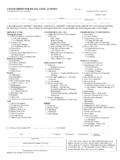Transcription of Public Guardian and Trustee of Manitoba
1 ENDURING POWEROF ATTORNEYA Guidebook for Donors and AttorneysPublic Guardian andTrustee of Manitoba Prepared by: The Public Guardian and Trustee of Manitoba 155 Carlton Street - Suite 500 Winnipeg MB R3C 5R9 October 2014 NOTE: This guidebook is not a legal document. It contains general information and is provided for the convenience and guidance of donors and attorneys under powers of attorney. If interpretation problems occur, please refer to your lawyer or the appropriate legislation. This publication is available in multiple formats upon request. For further information please contact our office at (204) 945- 2700.
2 POWER OF ATTORNEY GUIDEBOOK TABLE OF CONTENTS CHAPTER PAGE I INTRODUCTION A. What is a power of attorney? .. 3 B. What is an enduring power of attorney? .. 3 II Why have an enduring power of attorney? .. 4 III Who should be the attorney? .. 4 IV How to make an enduring power of attorney? .. 5 V What should be included in the enduring power of attorney? .. 6-8 VI Duties and powers of the attorney .. 9-10 VII When does an enduring power of attorney come into effect? .. 11 VIII Suspension of the enduring power of attorney .. 11- 12 IX How is an enduring power of attorney terminated? .. 12 X Application to Court of Queen s Bench.
3 13 XI The Power of Attorney Registry .. 14 APPENDIX A .. 15- 22 APPENDIX B .. 23- 27 CHAPTER I _____ INTRODUCTION A. What is a power of attorney? A power of attorney is a legal document in which one person (called the donor) gives authority to another person (called the attorney) to manage some or all of the donor s financial affairs. Powers of attorney deal only with financial affairs, and not with personal decisions. B. What is an enduring power of attorney? The law provides that the authority under a power of attorney ends if the donor becomes mentally incompetent and incapable of managing his or her own financial affairs. However, the law also allows a donor to include a clause in the power of attorney document allowing the attorney to continue acting even if the donor later becomes mentally incompetent.
4 If this clause (called the enduring clause) is included in the power of attorney, the document is referred to as an enduring power of attorney. This guidebook deals only with enduring powers of attorney. Some examples of the wording of the enduring clause are: The authority given to my attorney in this power of attorney is to remain in full force and effect unless and until expressly revoked by me, notwith- standing any future or periodic mental infirmity or incompetency on my part, or The authority of my attorney shall not terminate but shall continue despite any mental infirmity which I may suffer. These are only examples of enduring clauses. The donor may choose different wording.
5 In Manitoba , the rules concerning enduring powers of attorney are contained mainly in The Powers of Attorney Act , The Act is not reproduced here. A full copy may be obtained from: Statutory Publications 10-155 Carlton Street Winnipeg, Manitoba R3C 3H8 Telephone: 945-3101 Or online at: CHAPTER II _____ Why have an enduring power of attorney? Enduring powers of attorney are very useful to people who are concerned that a time may come when they are unable to look after their own affairs, and want to choose who will manage their affairs and how they will do it. Enduring powers of attorney can tell people what the donor s wishes are, even if the donor no longer can express those wishes.
6 They can often prevent the need for a costly court application to have a person (called a committee) appointed to manage the person s affairs. There are many issues to consider before making an enduring power of attorney. The advice of a lawyer should be sought before signing, as he or she will be able to help advise what should be included. CHAPTER III _____ Who should be the attorney? People considering an enduring power of attorney should think very carefully about who to appoint as attorney. It should be someone who can be trusted completely. Also, the person chosen should be a competent money manager. If a person cannot handle his or her own finances properly, chances are he or she will not be able to manage someone else s either.
7 Section 16 of The Powers of Attorney Act (The Act) provides that in order to act as an attorney, a person must be: an adult; mentally competent; and not an undischarged bankrupt. The person need not be a resident of Manitoba , or even of Canada. However, if the attorney does not live reasonably close to the donor, will it be convenient for him or her to manage the donor s affairs? Will he or she be able to do the banking from a distance, and tend to any needs the donor might have? Will he or she be accessible to people with whom the donor might have dealings? More than one person can be appointed as attorney. They may be appointed to act jointly (make decisions together) or successively (the second-named person only makes decisions if the first-named can t or won t).
8 If the donor is appointing more than one person to make decisions together, he or she should make certain that they can get along with each other, and are likely to agree on the decisions that need to be made. The donor should talk to them about his or her wishes and any concerns he or she may have before they are named as attorneys, and be satisfied that they will be able to act together and in the donor s best interests. If attorneys are to make decisions jointly, the donor must expressly say so in the enduring power of attorney. Otherwise, they will be deemed to be acting successively in the order in which they are named. Further information about how joint or successive attorneys make decisions will be provided later in this guidebook.
9 CHAPTER IV _____ How to make an enduring power of attorney? There is no required or standard form of enduring power of attorney. Forms are available at stationery stores, in kits or can be made up by the donor. However, the donor should see a lawyer prior to preparing or signing a power of attorney to obtain advice about the form it should take, what it should include, and who should act as attorney. Lawyers will usually be able to provide advice, and prepare the form for a fee. It is money well spent to ensure that your enduring power of attorney is properly made, and will best protect the donor s interests and wishes in the future. In order to make an enduring power of attorney, the donor must be mentally competent.
10 He/she must be able to understand the nature and effect of the document being signed. It must be signed voluntarily, and without duress or pressure from another person. Although the enduring power of attorney does not have to be in any particular form, it must conform with certain formal requirements. Section 10 of The Act provides that it must: be in writing; be signed by the donor in the presence of a witness, or the donor must acknowledge his or her signature in the presence of a witness; be signed by the witness in the presence of the donor; and provide that it is to continue despite the mental incompetence of the donor. A person who cannot sign his or her own name may ask another person to sign on his or her behalf, as long as the donor acknowledges the request in the presence of the witness.



